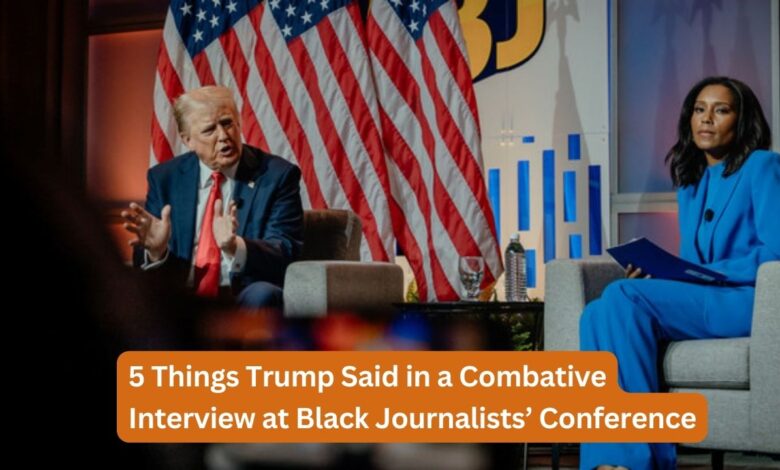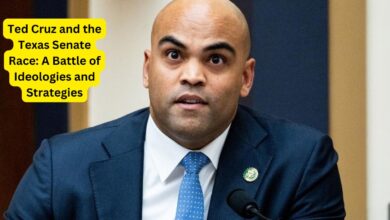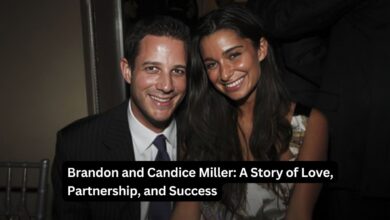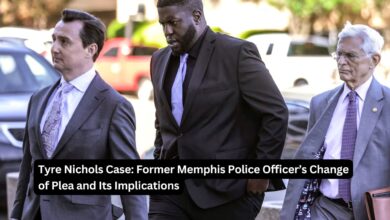5 Things Trump Said in a Combative Interview at Black Journalists’ Conference

In a recent interview at the National Association of Black Journalists (NABJ) conference, former President Donald Trump engaged in a contentious discussion with ABC News’ Rachel Scott. The interview covered a range of topics, including diversity, equity, and inclusion (DEI), as well as Trump’s previous comments about Black politicians and journalists. Here are five key moments from the interview that have sparked widespread attention and debate.
1. Trump’s Controversial Remarks on Kamala Harris
During the interview, Rachel Scott asked Trump whether he thought it was acceptable for some of his Republican colleagues to label Vice President Kamala Harris a “DEI hire.” Trump repeatedly demanded that Scott define DEI, even after she clarified that it stands for diversity, equity, and inclusion. Trump then proceeded to attack Harris over her identity.
“She was always of Indian heritage, and she was only promoting Indian heritage. I didn’t know she was Black until a number of years ago when she happened to turn Black and now, she wants to be known as Black,” Trump said. “So I don’t know, is she Indian or is she Black?”
This remark drew significant criticism, as it questioned Harris’s identity in a manner that many found offensive. Trump continued, suggesting that someone should “look into” Harris’ identity, further adding to the controversy.
2. Trump’s Initial Reaction to Scott’s Question
Right after shaking Scott’s hand and taking a seat on stage, Trump lashed out at her for the first question of the panel, which addressed why Black voters should trust him despite his use of derogatory language towards Black politicians and journalists. Trump’s immediate response was combative.
“Well, first of all, I don’t think I’ve ever been asked a question in such a horrible manner, the first question. You don’t even say, ‘Hello. How are you?’” Trump said. “Are you with ABC? Because I think they’re a fake news network, a terrible network.”
This set the tone for the rest of the interview, highlighting Trump’s contentious relationship with the media, particularly journalists of color.
3. Trump’s Defense of His Record with Black Voters
Throughout the interview, Trump attempted to defend his record with Black voters, claiming he has been “the best president for the Black population since Abraham Lincoln.” However, his defense was marred by his continuous insults towards Scott, whom he accused of being hostile and rude.
“I think it’s a very nasty question,” Trump said. “I’ve done more for the Black community than any other president, except for maybe Abraham Lincoln.”
Trump’s assertion has been a point of contention, with many critics arguing that his policies and rhetoric have often been harmful to Black communities.
4. Trump’s Attacks on Black Women Journalists
The interview at the NABJ conference was not the first time Trump has used disparaging language towards Black women journalists. During his presidency, he called White House correspondent April Ryan a “loser” and told CNN’s Abby Phillip, “you ask a lot of stupid questions.”
In this interview, Trump continued this pattern by calling Scott’s question “hostile” and a “disgrace.” This behavior has drawn widespread condemnation for perpetuating a dismissive and derogatory attitude towards Black women in the media.
5. Trump’s Avoidance of Direct Answers
Throughout the interview, Trump often avoided giving direct answers to Scott’s questions. When pressed about whether he believes Harris was a “DEI” pick, he replied ambiguously, “I really don’t know, could be, could be. There are some.”
This evasive approach frustrated many viewers who were looking for clear and direct responses. Instead, Trump’s answers often diverted back to attacking the credibility of the media and questioning the motives of his interlocutors.
Conclusion
The combative interview at the NABJ conference showcased Trump’s contentious relationship with the media, particularly Black journalists. His remarks on Kamala Harris’s identity, his attacks on Rachel Scott, and his defense of his record with Black voters have sparked significant debate and criticism. As Trump continues to be a prominent figure in American politics, his interactions with the press and his stance on issues of diversity and inclusion remain closely scrutinized.




